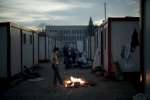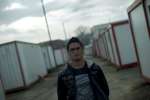- Text size
 |
|  |
|  |
| 
- Français
UNHCR urges more attention for Afghan children on the move
Setting the Agenda, 14 June 2010
GENEVA, June 14 (UNHCR) – A UNHCR report released on Monday says growing numbers of Afghan children are making a difficult and dangerous overland journey to Europe, travelling without their parents and exposed to dangers and human rights abuses.
The study, published by UNHCR's Policy Development and Evaluation Service, presents recommendations on how governments, including the leadership of Afghanistan, should respond to this complex issue.
More than 5,900 Afghan children, mostly boys, sought asylum in Europe last year, compared to 3,380 in 2008. Last year, Afghan youth made up 45 per cent of asylum claims from unaccompanied children, almost three times those made by Somalis, who comprised the second largest group. UNHCR believes that there are many other Afghan children on the move who do not apply for asylum.
UNHCR's study examines the reasons for the departures, the routes the children take and their reception on arrival. It finds that while some children travel more or less directly from Afghanistan, others have lived for years in Iran or Pakistan.
Afghan youth are trying to reach Europe for several reasons, including the continuing conflict in Afghanistan and shrinking protection space in neighbouring countries. Individual experiences of war and human rights violations, such as forced labour and kidnapping, combined with insecurity, widespread poverty, political instability, poor educational prospects and a declining hope for a brighter future are all fuelling the flows, as are expanding smuggling networks.
"Afghanistan appears to have turned a blind eye to the role of smugglers in irregular migration, including children. Afghan parents, families and communities have allowed and encouraged the departure of their children on hazardous journeys," the report states. It urges more action in Afghanistan to ensure that families are aware of the risks of putting their children in the hands of people smugglers.
UNHCR's study notes that Afghan youth arriving in Europe do not always receive the support they need. As a result, they often remain in the hands of the smugglers, who entice them to continue their journey. Large numbers of Afghan boys are among the inhabitants of makeshift settlements in places like Calais, France and Patras, Greece.
"These children face shocking hardships along the way," said Judith Kumin, UNHCR's Director for Europe. "But they feel an obligation to their families to continue their journey. As a result, they are victimized over and over again."
Not all Afghan youth arriving in Europe qualify as refugees, although many receive an international protection status. The report urges states to take into account the deteriorating security situation in parts of Afghanistan.
Where return to Afghanistan is contemplated, it must be assessed whether this is in the child's best interest. The report underlines that family tracing, appropriate reception, guardianship and long-term integration opportunities on return are all important elements.
UNHCR released its research, "Trees Only Move in the Wind: A Study of Unaccompanied Afghan Children in Europe," shortly after the European Commission presented its "Action Plan on Unaccompanied Minors," which promotes a consistent approach to the treatment of unaccompanied children arriving in Europe from third countries.
The UNHCR study involved interviews with 150 Afghan boys in France, Greece, Italy, the Netherlands, Norway and the United Kingdom, while the experiences of several dozen other youth in Turkey were also incorporated. Additional research undertaken by UNHCR's office in Sweden will be released soon.









































